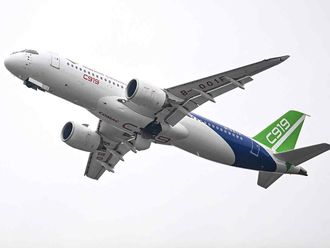Hong Kong's controversial bullet train got off to a smooth start on Sunday, as hundreds of passengers whistled north across the border at speeds of up to 200 kph, deepening integration of the former British colony with mainland China.
While the $11 billion rail project has raised fears for some over Beijing's encroachment on the Chinese-ruled city's cherished freedoms, passengers at the sleek harbor front station were full of praise for a service that reaches mainland China in less than 20 minutes.
"Out of 10 points, I give it nine," said 10-year-old Ng Kwan-lap, who was travelling with his parents on the first train leaving for Shenzhen at 7 a.m.
"The train is great. It's very smooth when it hits speeds of 200 kilometres per hour." Mainland Chinese immigration officers are stationed in one part of the modernist station that is subject to Chinese law, an unprecedented move that some critics say further erodes the city's autonomy.
The project is part of a broader effort by Beijing to fuse the city into a vast hinterland of the Pearl River Delta including nine Chinese cities dubbed the Greater Bay Area.
Beijing wants the Greater Bay Area, home to some 68 million people with a combined GDP of $1.5 trillion, to foster economic integration and better meld people, goods and sectors across the region.
Critics say the railway is a symbol of continuing Chinese assimilation of Hong Kong, which returned to Chinese rule in 1997 with guarantees of widespread autonomy and freedoms not enjoyed on the mainland, including an independent legal system.
Opponents warn giving away control of land in the heart of Hong Kong is a dangerous precedent as Beijing seeks to tighten its grip on the city following mass pro-democracy protests in 2014 and the emergence of an independence movement.
"It's almost like an imperialist attitude on the part of Beijing," pro-democracy lawmaker Claudia Mo told AFP.
"Anything can happen now in Hong Kong at the behest of the Beijing big boss," she added.
There are also questions over how Hong Kong citizens will be required to behave in the zones subject to Chinese law, whether they will be punished for using Facebook and Twitter - banned on the mainland - or targeted for wearing clothing with political slogans.
A government information leaflet says the public will still have access to the same content on their phones in the mainland parts of the station, but warns that "passengers' general conduct" will be subject to mainland law in those spaces.
But at a ceremony on Saturday ahead of the public opening, Hong Kong leader Carrie Lam praised the so-called "co-location" arrangement with Beijing which the government has said is necessary to streamline immigration.
Scores of excited passengers straddled a yellow strip across black tiles that highlighted the demarcation line between Hong Kong and mainland China, while others passed through turnstiles surrounded by red, orange and white balloons.
"I'm excited to experience the high-speed train, even more excited than when I take a plane," said a 71-year-old retiree surnamed Leung.
There are concerns too over the sharing of personal information with Chinese authorities, including via a mainland-based wi-fi provider that will operate in the parts of the station under Chinese jurisdiction.
However, pro-establishment lawmaker Regina Ip described the fears as "overblown", emphasising that mainland personnel were restricted to the special port area.
"(The rail link) provides unprecedented convenience of travel ... we can have one-stop clearance, that will greatly enhance our connectivity with the Pearl River Delta," she said.
The special port area was quietly handed over to mainland personnel earlier in September.
The rail link provides direct access to China's massive 25,000-km national high-speed rail network and authorities on both sides have hailed it as a breakthrough that will bring economic benefits, including increased tourism.
"No matter what you think about the new line, high-speed rail is extremely convenient," said Feng Yan, assistant professor at the Communication University of China in Beijing who took the bullet train from Shenzhen to Hong Kong.
"Even if it takes some time for people to realise how convenient it is, sooner or later they will."












